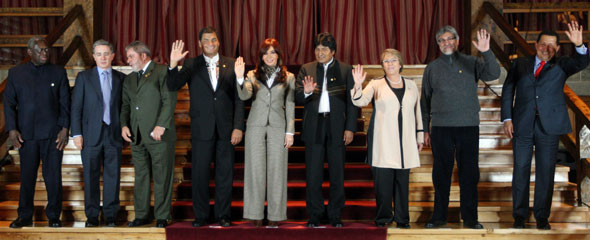
Colombia Reports fellow columnist Gustavo Silva Cano wrote a magnificent column on Monday in which he called on Colombia to leave UNASUR. As surprising as it may seem, I could not agree more. The government should part ways with UNASUR in order to defend its interests.
UNASUR (Union of South American Nations), a Brazilian idea, was officially created on May 23, 2008 with the signing of the Constitutive Treaty. The aim was to foment the integration of South American countries by mirroring the European Union. Among the initiatives that stand out are the Bank of the South and the South American Defense Council. The former seeks to end reliance on the International Monetary Fund, while the latter aims to ensure regional security.
Colombia, however, has been a skeptic and a reluctant member of UNASUR and of its initiatives. Colombia has not joined the Bank of the South and only joined the South American Defense Council after turning 180 degrees from a previous position. In recent months Colombia’s perception towards UNASUR as a regional forum have also deteriorated. Colombia visited Chile (which held UNASUR’s presidency at the time) in 2008 to support Bolivian President Evo Morales after an attempted coup. But this year with UNASUR’s negative position towards the Colombia-U.S. military agreement, Bogota has become more openly critical of the organization and its actual interests.
Uribe did not attend a UNASUR summit on August 10, where Chile and Brazil proposed to discuss the military agreement, because the agreement was a sovereign issue and the summit would only serve to trample on Colombia’s dignity. Instead, Uribe visited all South American nations, except Ecuador and Venezuela, to dissipate concerns. And yet UNASUR organized a special meeting on August 28 in Bariloche, Argentina, specifically to address the issue. In the meeting Uribe’s isolation became evident. Since then, Uribe has turned to the United Nations Security Council and the Organization of American States (OAS), rather than UNASUR, to file concerns about Chavez’s war rhetoric. And last week, the Defense Council organized a meeting to address the espionage incidents between Colombia and Venezuela, and Chile and Peru. But Bogota sent low level officials to avoid further verbal attacks.
The differences between Colombia and most of the South American nations also include diplomatic responses to world issues. The most recent has been the Honduran presidential election. Colombia, together with Peru, is the only country in South America siding with the U.S. in backing the Honduran elections and Porfilio Lobo as the elected president.
Due to this background and this antagonism, Colombia should leave UNASUR. This is certainly the best solution, not because there is an anti-Colombian attitude in the regional body, but because Colombia is hindering UNASUR’s progress. Colombia’s unconditional alliance with the U.S. contravenes the spirit of UNASUR.
UNASUR offers a forum that had been missing in the subcontinent. Forums are important for not only dissipating potential conflicts through dialogue, but also to defend the region’s interests in multilateral bodies such as the UN, IMF, Climate Conferences, etc., where consensus is crucial.
The political will needed to make UNASUR a reality has been enormous and since 2008 the regional block has taken important steps towards uniting the continent and protecting the region’s interests. Naturally, the election of progressive governments has been key for UNASUR’s momentum and for its desire to achieve its ultimate aims of finding solutions to the problems affecting the region such as persistent poverty, social exclusion and inequality; problems that are endemic in Colombia.
While Colombia’s mistrust towards Venezuela is understandable, it must not become an excuse to dismiss the importance of UNASUR in promoting the region’s emancipation. Apart from Venezuela, most countries have assertively but diplomatically expressed their natural concerns about the military agreement. These concerns seem well-substantiated on reading the ambiguous document. Colombia’s initial diplomatic ambivalence towards UNASUR, together with its diplomatic failure in dealing with the military agreement, have not persuaded other countries to be more sympathetic to Colombia’s cause. And yet it would be easier to change the region’s perception about Colombia if the country worked from within the regional block.
Nevertheless, Colombia can move forward without UNASUR and vice versa. Therefore, Colombia parting ways with UNASUR would facilitate the region’s emancipation, thereby allowing UNASUR to at least tackle the region’s social ailments.

